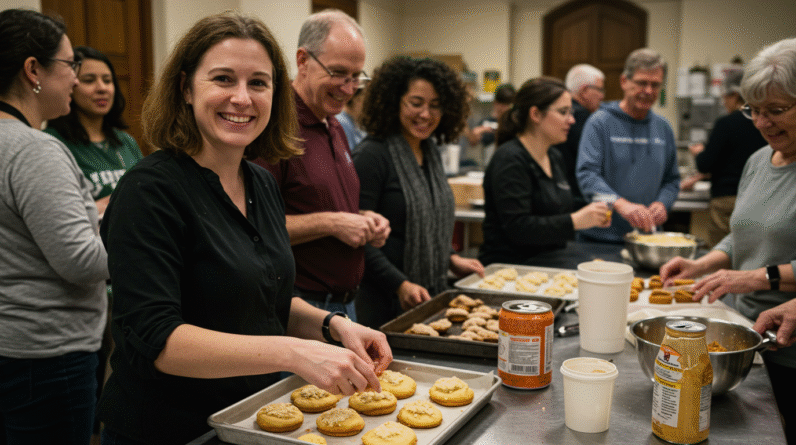The Joy That Comes From Serving – Philippians 2:3–4
You’ve probably read Philippians 2:3–4 before and felt a gentle nudge, or maybe a convicting shove, to rethink how you treat people. These two verses are short, but they’re dense with life-changing truth. When you put others before yourself — not as a duty but as a delight — you unlock a deep, lasting contentment in your relationship with Christ and with people. In this article, you’ll learn what Paul is getting at in Philippians, how Jesus modeled this for you, practical ways to live it out, obstacles you’ll meet, and why, when you serve, you experience the real joy that comes from serving. You’ll walk away with specific steps you can take this week to cultivate humility, love, and joy in everyday life.
Reading Philippians 2:3–4
Begin with the passage itself and allow the words to settle in your heart. Philippians 2:3-4 says, “Do nothing out of selfish ambition or vain conceit. Rather, in humility value others above yourselves, not looking to your own interests but each of you to the interests of the others.” Paul’s command is simple to read and hard to practice — which is exactly why you need this reminder.
When you read those words, notice the force of the verbs: do nothing out of selfish ambition; value others above yourself; don’t look only to your own interests. Paul is giving you a way of life. He isn’t offering a project for your spiritual checklist. This is the posture of a disciple. You’re invited into a pattern of thought and action that reorients your heart away from the center — away from you — and toward Christ and others.
What Paul Means by Humility and Selflessness
Paul uses the Greek words that point to an attitude of mind and heart. What he’s asking for isn’t false modesty or self-deprecation. He’s calling you to an honest assessment of yourself — one that doesn’t inflate your significance and one that actively values other people’s needs and gifts. You’re not to act from selfish ambition or empty pride; instead, you’re to consider others worthwhile, and you’re to be motivated to serve.
This humility is practical. It changes how you respond when someone cuts you off in traffic, when a colleague takes credit for your work, or when a neighbor needs help. It changes your priorities, your schedule, and even your language. Humility makes you ask, “How can I serve?” before you ask, “What’s in it for me?” Paul wants you to build a life where your default reaction is to lift others rather than lift yourself.
Jesus: The Ultimate Example
If you want a live example of humility, look at Jesus. Paul immediately follows these verses with the model of Christ in Philippians 2:5-8. Jesus, though in very nature God, did not cling to His status. He emptied Himself, took the form of a servant, and became obedient to death—even death on a cross. That is the benchmark for your humility.
Jesus didn’t serve because it was glamorous. He served because it was necessary. He washed His disciples’ feet in John 13:12-15 to teach them that leadership is measured by the willingness to serve the lowliest tasks. He told His followers that He came not to be served but to serve, and to give His life as a ransom for many, in Mark 10:45. When you model your life after Jesus, you learn that serving is not a footnote to love — it is the language of love.
What Serving Is — and Isn’t
Serving is not doing errands for someone because you feel guilty. It’s not volunteering as a way to get recognition or to make yourself feel superior. Serving is love in action that flows from a heart transformed by grace. It’s sacrificial, humble, and often anonymous.
Because serving is the handmaiden of love, it looks different in different seasons of your life. Sometimes serving will be grand and visible; other times it will be quiet and unnoticed. But the motive that pleases God is the same: you serve out of genuine concern for the well-being and flourishing of others.

The Joy That Comes from Serving in Everyday Life
When you begin to put others first, you start to experience the joy that comes from serving. It’s a joy that isn’t dependent on applause, success, or even immediate results. Instead, it’s rooted in the fact that you are living the way Jesus lived — giving yourself away for the sake of others. This joy surfaces in different ways: peace of conscience, a sense of purpose, deeper relationships, and an awareness that you are cooperating with God in His work in the world.
Serving rewires your soul. You begin to measure success not by personal gain but by how faithfully you love. You’ll notice that when somebody else is helped, when pain is eased, and when hope is restored, you share in a profound delight that transcends circumstances. That is the joy that comes from serving: it’s spiritual, contagious, and transformative.
Practical Ways to Serve Today
You don’t have to wait for a big calling to start serving. The small, consistent acts of service are what build a life of humility. Start with your immediate circle — your household, your workplace, your neighborhood, your church. What do they need that you can give without waiting to be asked?
- Offer to babysit so parents can rest.
- Make a meal for someone recovering from surgery.
- Listen to a friend without trying to “fix” everything.
- Volunteer a few hours at a local community center or food pantry.
Those are simple measures, but when you adopt them as a pattern, you cultivate the habit of looking outward. Galatians says you were called to serve one another humbly in love, “Galatians 5:13.” When you practice these small acts, the joy that comes from serving begins to take root in your daily routine.
Serving in the Church and the Community
The church is designed to be a training ground for service. In 1 Peter 4:10, you’re reminded that you’ve received gifts to serve others as faithful stewards of God’s grace. This means that your gifts aren’t primarily for your benefit — they’re for the body. Your talents, time, and treasures are tools for building God’s kingdom.
When you serve in the church, you model Jesus’ servant leadership and help the community function as it should. When you serve in your neighborhood or workplace, you bring the gospel’s love into the public square. Serving opens doors for relationships and testimony that spoken words alone cannot always open. And again, you’ll taste the joy that comes from serving as people are helped and lives are touched.
Barriers to Serving and How to Overcome Them
You’ll face obstacles when you try to live out Philippians 2:3-4. Pride, busyness, fear of being used, and the desire for recognition are real challenges. But Scripture gives you practical responses.
- Pride: Remember Christ’s humility in Philippians 2:5-8 and remind yourself that you are saved by grace, not your performance.
- Busyness: Reassess your schedule. You can always find 30 minutes a week to serve if you are intentional. Jesus often withdrew to pray, but He never withdrew from people in need.
- Fear of being used: Healthy boundaries are wise. Serving isn’t an agreement to be mistreated. Learn to say “no” when necessary, but don’t use the fear of being exploited as a reason to avoid serving altogether.
- Desire for recognition: Serve anonymously at times. Let your Father in heaven be your reward; as Jesus taught in Matthew 6:1-4, give without broadcasting it.
None of these obstacles is insurmountable. They simply reveal where you need deeper dependence on Christ and a renewed perspective on what truly matters.
Theological Reasons Serving Brings Joy
There are deep theological reasons why serving leads to joy. First, serving aligns you with the heart of God. God is a giver by nature; He didn’t spare His own Son but gave Him for your salvation. When you join in that giving, you participate in God’s character, and participation brings joy.
Second, service is a form of worship. When you love your neighbor, you are obeying the greatest commandments: to love God and to love others. Obedience produces joy, as you discover in the lives of people who have walked with Christ for years.
Third, serving breaks the tyranny of self. When your life becomes less about protecting your image and more about blessing others, you’re no longer driven by insecurity. Freedom from self-centeredness produces a lightness of spirit and the peaceful joy of knowing you’re living on mission.
These truths echo in other scriptures. Paul reminds you in Acts 20:35 that “it is more blessed to give than to receive.” When you give — of time, energy, resources, and love — you discover a blessedness that money can’t buy.
What True Humility Looks Like in Action
Humility isn’t shrinking yourself; it’s seeing yourself truly and others rightly. It looks like listening before speaking, admitting mistakes, accepting correction, and giving others the spotlight. When you humbly serve, you’re not competing for status; you’re joining a team. You make room for others to flourish.
True humility also means you don’t measure your worth by what you’ve achieved. You measure it by your identity in Christ. When you see yourself as beloved by God rather than as someone who needs to prove themselves, you’ll serve freely and joyfully. This freedom is the soil where the joy that comes from serving grows.
Serving Without Recognition: The Hidden Reward
You’ll likely serve in ways that never make the news. You might change diapers, tutor a child, do behind-the-scenes maintenance at church, or pray with someone late at night. Often, the most significant acts of service go unnoticed. That’s okay — in fact, that’s the point.
Jesus taught that when you give quietly, your Father who sees in secret will reward you. The reward may not be fame or even a visible blessing, but it will be the certification of your heart by God himself. The joy that comes from serving often feels like quiet confirmation from the Spirit: “Well done, good and faithful servant.” In that moment, you know you’ve been part of something eternal.
The Community Effect: Serving Multiplies Joy
When you serve, you not only receive joy personally — you catalyze joy in others. A single act of kindness can have ripple effects: it encourages, restores, and inspires. When people are cared for, they’re empowered to care for others. Community becomes a living organism of mutual love. This multiplication is how churches thrive and neighborhoods are transformed.
Paul envisioned a church where members take each other’s burdens, rejoice with those who rejoice, and mourn with those who mourn. When you enter into that kind of community life, your daily routine becomes a training ground for joy. Serving becomes normative, not optional, and the collective joy swells because many hands are at work.
Real-Life Stories of Serving and Joy
You learn best from stories. Imagine the single mom whose neighbor brought a week’s worth of dinners during a crisis. The mother didn’t get a pat on the back; she got time and energy to focus on healing. The neighbor tasted the joy that comes from serving as she watched a little family breathe easier.
Think of a man who retired and started cutting the grass of elderly neighbors. He didn’t tell anyone; he just wanted to help. Yet in the process he built relationships, found purpose in the season of retirement, and experienced a peace that eclipsed his earlier anxieties. These are ordinary stories — but they’re the stuff of heaven.
An elder in one church I know quietly paid rent for a family in crisis, and years later, that child grew up to become a loving, generous parent in the same church. You see how one act of service can redirect an entire life trajectory? That is part of the joy that comes from serving: you participate in God’s redemptive work in ways you may never fully see.
Serving as Spiritual Formation
Serving shapes your character. It teaches patience, fuels compassion, and corrects self-centeredness. For you, serving can be a spiritual discipline — not a spiritual achievement. When you submit yourself to serve regularly, you’re creating habits that keep your soul aligned with Christ.
If you want to grow in Christlikeness, start serving in small, faithful ways and allow God to work in your heart through those actions. Spiritual formation isn’t primarily about knowledge accumulation; it’s about being formed into the image of Jesus. Service is one of the primary ways that happens.
How to Make Serving Sustainable
Serving can burn you out if you do it out of guilt or without rest. To make it sustainable, balance is essential. Rest in God’s rhythms, maintain healthy boundaries, and serve from a place of abundance rather than scarcity. Schedule sabbath rest, cultivate friendships that refresh you, and allow people to serve you sometimes, too.
Also, diversify your service. Don’t pour the same resource into the same place until you collapse. Use your gifts in a variety of contexts so that when one area becomes draining, another can refill you. Remember: the goal isn’t to be busy for God; it’s to be faithful with what God has given you.

Steps to Start Serving Right Now
You don’t need permission to begin. Here are simple steps you can take this week to begin practicing what Paul describes:
- Pray and ask God to show you one person to serve this week.
- Write down a small, concrete action you can do (bring a meal, offer a ride, send an encouraging note).
- Do it without announcing it on social media.
- Afterwards, journal briefly how it made you feel and what you learned.
A rhythm like this keeps you humble and teaches you to depend on the Spirit. Over time, these small acts compound into a life of meaningful service and profound joy.
When Serving Hurts: Processing Disappointment
There will be times when serving brings disappointment — when your efforts are misunderstood or unappreciated. That’s part of the cross. When you experience those hurts, don’t retreat into bitterness. Process the disappointment through prayer, bring it before a trusted friend or mentor, and allow God to comfort your soul.
Remember Jesus’ words in Matthew 25:40: when you serve the least of these, you are serving Him. Even if people don’t honor your service, God sees and honors it. That assurance will sustain you when external affirmation is absent.
Teaching Others to Serve
If you’re leading a family, a small group, or a ministry, your modeling matters. Teach the next generation to serve by including them. Give children age-appropriate responsibilities. Invite volunteers to participate in simple tasks. Celebrate service quietly and consistently. When serving becomes a family or community value, joy is multiplied and sustained across generations.
You’re raising up future servants when you prioritize service today. Show them that serving is not a chore but a way of life that brings meaning, connection, and spiritual maturity.
Rejoicing in God’s Reward
God promises a reward. Not always in ways you expect, but always in ways that matter. The reward might be a stronger body of believers around you, healed relationships, or personal growth in Christlikeness. Ultimately, your final reward is hearing the words, “Well done, good and faithful servant,” and entering fully into His presence.
This eternal perspective frees you from an anxious drive for immediate gratification and lets you serve with the deep joy that comes from serving. Your labor is never wasted in the Lord. Even when results are slow or unseen, you are planting seeds in fertile soil.
Conclusion: Your Invitation to Live Out Philippians 2:3–4
You’ve been given a clear invitation in Philippians 2:3-4: to live humbly, to value others, and to look not only to your own interests but to the interests of others. When you accept that invitation, you won’t just obey a command — you’ll discover the deep and abiding joy that comes from serving. This joy is a spiritual fruit, a sign that your life is aligned with Jesus’ own heart and mission.
Start small. Be consistent. Serve with the posture of Christ. Let your life be an answer to the world’s hunger for love and meaning. You may be surprised to find that in giving your life away, it returns to you full and rich, seasoned with the peace and satisfaction that only God can give.
Explore More
For further reading and encouragement, check out these posts:
👉 7 Bible Verses About Faith in Hard Times
👉 Job’s Faith: What We Can Learn From His Trials
👉 How To Trust God When Everything Falls Apart
👉 Why God Allows Suffering – A Biblical Perspective
👉 Faith Over Fear: How To Stand Strong In Uncertain Seasons
👉 How To Encourage Someone Struggling With Their Faith
👉 5 Prayers for Strength When You’re Feeling Weak

📘 Jesus and the Woman Caught in Adultery – Grace and Mercy Over Judgement
A powerful retelling of John 8:1-11. This book brings to life the depth of forgiveness, mercy, and God’s unwavering love.
👉 Check it now on Amazon
As a ClickBank Affiliate, I earn from qualifying purchases.
Acknowledgment: All Bible verses referenced in this article were accessed via Bible Gateway (or Bible Hub).
“Want to explore more? Check out our latest post on Why Jesus? and discover the life-changing truth of the Gospel!”








